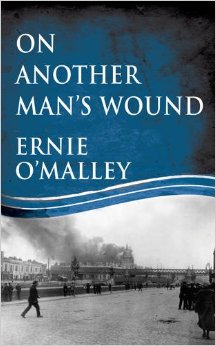 Summary: a masterpiece with resonances and relevance beyond its geographic and historical contexts.
Summary: a masterpiece with resonances and relevance beyond its geographic and historical contexts.
“On another man’s wound” is generally regarded as the only personal account by an Irish War of Independence commander that has true literary merit. It is a beautifully written and gripping narrative of O’Malley’s experiences from 1916 to 1921. The book is packed with incident from initial observations on the 1916 rebellion to guerrilla action in the South, to his capture in Kilkenny, subsequent torture, and his participation in the only successful escape from Kilmainham gaol in Dublin. Along the way there are interesting pen portraits of many of the leading figures of the time including Erskine Childers, Liam Lynch, and, not least, Michael Collins.
At its heart the book is a remarkably honest account of the brutalising effects of war: Towards the end O’Malley describes unflinchingly his decision to murder three captured British soldiers just before the Truce. The effect is both chilling and moving: O’Malley’s literary acheivement is to show how his personal experiences are representative of all soldiers in war, which can transform idealistic youth into diminished and bloody men in a pattern that is repeated through history and across the world to this day.
As such the book retains a relevance beyond it geographic and historical contexts: It speaks a truth that should be remembered by all contemplating sending young people to kill and die on behalf of some cherished cause, particularly if the closest the decision-makers have been to war is an Oxford PPE course or a London law chambers.

Pingback: “Stop and we’ll fight them”: Collins’ tactics at Beal na mBlath | aidanjmcquade
Pingback: The Silence of the Girls, by Pat Barker | aidanjmcquade
Pingback: The Big Sleep, by Raymond Chandler | aidanjmcquade